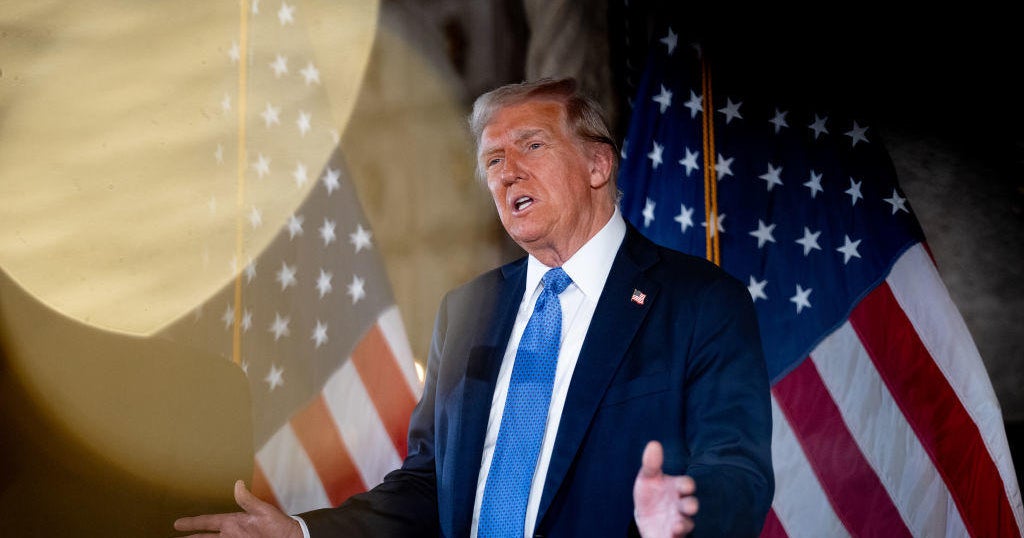CBS News
Why some experts say you shouldn’t wait for mortgage rates to fall

Getty Images
If you’re in the market for a new home, today’s mortgage rates can hinder your efforts. After all, the higher your mortgage rate, the higher your monthly payments will typically be. So, it can be difficult to find affordable housing options in today’s high-rate environment.
But the good news is that there are still good housing options available. And, while waiting for a lower interest rate might seem like a smart move, some experts say doing so would be a mistake. But why wouldn’t you want to wait for lower mortgage rates before you purchase a new home?
Find out how affordable your mortgage loan can be today.
Why some experts say you shouldn’t wait for mortgage rates to fall
Interest rates are a common consideration among home buyers — but should you wait until mortgage rates fall to buy? Many experts say no. Here’s why.
Lower rates could lead to lower inventories and higher prices
“Buying a home is a big decision that needs careful consideration,” says John Dustman, SVP, head of consumer lending and advisor banking at Axos Bank.
“One common concern among buyers relates to market conditions and how changes in interest rates impact home prices and inventory levels,” says Dustman. “As most house hunters know, inventory levels in just about every community in the U.S. are very low and have been since the COVID-19 pandemic and historically low mortgage rates available in 2020 and 2021.”
“Active inventory fell to levels that were a third or less than inventory levels in 2019 during the 2021 peak in demand,” says Dustman. “Since then, inventory levels have increased but are still at levels equal to about 50-60% of available inventory in 2019.”
Considering the low inventory levels, home prices would typically rise. However, with rates as high as they are right now, it may be keeping home values from increasing further, according to Dustman. But that may change.
“Many buyers have been waiting on the sidelines due to high rates and challenges they are facing qualifying for mortgages with high rates and home prices,” says Dustman. As rates fall and these buyers on the sidelines flood the market, inventory could fall further and home prices could rise.
That’s why, generally speaking, the best time to buy a home is when rates are higher and demand is lower, according to Dustman.
Find the best mortgage loan offer for you online now.
You could miss out on your dream home if you wait too long
It can be difficult to find your dream home with inventories low across most housing markets nationwide. However, if you wait too long, you could miss out entirely.
“People are always going to need to buy homes — whether they are upsizing with a growing family, downsizing as empty nesters, moving for a job or are simply ready to take the next step in their life’s journey and become a homeowner for the first time,” says Austin Niemiec, chief revenue officer for Rocket Mortgage.
“Maybe someone’s dream home becomes available and it doesn’t coincide with the most favorable rate environment, but waiting for rates to drop could mean missing out on that perfect opportunity,” says Niemiec. “As long as they can comfortably afford the payment now, the homebuyer always has the chance to refinance if rates drop in the future to get a better monthly payment.”
It’s hard to time the market
“Trying to time the homebuying market and rates is difficult because no one has a 100% accurate crystal ball to predict what conditions will look like even in a few months from now,” says Bob Driscoll, SVP and director of residential lending at Rockland Trust Bank. “The ‘perfect time’ to buy a home is a myth.”
“Instead, prospective homebuyers should buy a home on a timeline that works best for their life and future plans,” says Driscoll. “Aligning your home purchase with your goals and values will certainly have a better return on your investment than waiting around for rates to fall.”
Learn more about your mortgage options now.
The bottom line
Interest rates could drop in the future, but you may not want to wait for that to happen to buy a home. If you wait for rates to fall, you could face higher home prices or miss out on your dream home. Rather than waiting for rates to fall, it may be a wise choice to purchase your home now and consider refinancing later.
CBS News
Frito-Lay recalls Lay’s Classic Potato Chips over undisclosed ingredient

Frito-Lay is recalling a limited number of 13 oz. bags of Lay’s Classic Potato Chips after being alerted by a consumer contact that the product may contain undeclared milk.
The bags of chips affected by recall were distributed to certain retail stores and e-commerce distributors in Oregon and Washington and were available for sale beginning Nov. 3, 2024.
“Those with an allergy or severe sensitivity to milk run the risk of a serious or life-threatening allergic reaction if they consume the recalled product,” the Food and Drug Administration said in the recall notice posted Thursday.
No allergic reactions related to the recall have been reported, according to the recall. Additionally, no other Lay’s products, flavors, sizes or variety packs are affected.
FDA
The recalled chips include Lay’s Classic Potato Chips, in flexible 13 oz. (368.5 grams) bags with UPC code 28400 31041, a “Guaranteed Fresh” date of 11 Feb 2025, and one of either two manufacturing codes: 6462307xx or 6463307xx.
General guidelines from the FDA advise consumers who have purchased any recalled food to dispose of the product or return it to the retailer for a full refund.
CBS News
What to know about DA Fani Willis’ removal from Trump case

Watch CBS News
Be the first to know
Get browser notifications for breaking news, live events, and exclusive reporting.
CBS News
What is the debt ceiling? Here’s why Trump wants Congress to abolish it before he takes office

Washington — President-elect Donald Trump, Vice President-elect JD Vance and billionaire Elon Musk blew up a GOP-backed deal to fund federal agencies into March, raising the pressure on Republican congressional leaders to craft a plan to avert a government shutdown just before the holidays.
In a statement Wednesday, Trump and Vance lambasted the agreement for including provisions favored by Democrats. But the incoming president and vice president also added a new, significant wrinkle to negotiations when they urged Congress to raise or abolish the debt ceiling now, instead of next year.
“Increasing the debt ceiling is not great but we’d rather do it on Biden’s watch,” Trump and Vance said in their statement. “If Democrats won’t cooperate on the debt ceiling now, what makes anyone think they would do it in June during our administration? Let’s have this debate now.”
What is the debt ceiling?
Set by Congress, the debt ceiling, or limit, is the maximum amount of money the U.S. Treasury is authorized to borrow to pay debts incurred by the federal government. Lifting the debt ceiling does not authorize new spending, but instead lets the government spend money on obligations that Congress has already been approved.
Failing to address the debt ceiling could lead the U.S. to default on its debt, which would have devastating effects on the economy. The government has never defaulted, and the Treasury typically uses accounting moves, known as “extraordinary measures,” to delay breaching the debt ceiling.
While raising the debt ceiling used to be routine, legislation addressing it has in recent years been used as leverage to force policy concessions and fuel debates over government spending.
Congress last addressed the debt ceiling in June 2023 as part of a legislative package negotiated by President Biden and then-House Speaker Kevin McCarthy. That deal suspended the debt ceiling through Jan., 1, 2025, ensuring any fight over it would take place after the 2024 elections.
The Treasury Department will likely implement extraordinary measures to stave off a default in the new year. It will also announce an “X date,” the estimated point at which the government will no longer be able to pay its obligations. The Economic Policy Innovation Center, a conservative think tank, projected in an analysis released Monday that it’s possible the debt limit will be reached by June 16.
While the Treasury Department’s use of extraordinary measures would give Congress more time to address the debt ceiling, Trump is now urging lawmakers to take action now, before he takes office.
Why does Trump want to raise the debt ceiling?
The president-elect will come into office with a legislative to-do list that includes securing the border and extending provisions of his signature Tax Cuts and Jobs Act, which was enacted in 2017 and overhauled the tax code. But a fight over the debt ceiling could complicate efforts by the Republican-led House and Senate to focus on those legislative initiatives and pass them quickly.
Trump is urging lawmakers to eliminate the debt ceiling altogether, a position that some prominent Democrats have endorsed in the past.
“Number one, the debt ceiling should be thrown out entirely,” Trump said in a phone interview Thursday with CBS News’ Robert Costa. “Number two, a lot of the different things they thought they’d receive [in a recently proposed spending deal] are now going to be thrown out, 100 percent. And we’ll see what happens. We’ll see whether or not we have a closure during the Biden administration. But if it’s going to take place, it’s going to take place during Biden, not during Trump.”
Trump separately told ABC News that “there won’t be anything approved unless the debt ceiling is done with,” indicating any spending deal to prevent a shutdown must address the debt limit.
“If we don’t get it, then we’re going to have a shutdown, but it’ll be a Biden shutdown, because shutdowns only [injure] the person who’s president,” he told ABC News.
Whether Republicans and Democrats would go along with such a plan, though, is far from clear. GOP lawmakers in both chambers have opposed raising the debt ceiling without spending reforms, and debates over the debt limit often give way to broader fights over the federal budget, which conservatives in Congress have said is bloated and should be reduced. Plus, Democrats still control the Senate and the White House.
White House press secretary Karine Jean-Pierre said in a statement Wednesday that shutting down the government would harm families and endanger services Americans rely on.
“Republicans need to stop playing politics with this bipartisan agreement or they will hurt hardworking Americans and create instability across the country,” she said. “President-elect Trump and Vice President-elect Vance ordered Republicans to shut down the government and they are threatening to do just that — while undermining communities recovering from disasters, farmers and ranchers, and community health centers.”
House Democratic Leader Hakeem Jeffries suggested Democrats would not go along with a plan pushed by Republicans to raise the debt limit.
“GOP extremists want House Democrats to raise the debt ceiling so that House Republicans can lower the amount of your Social Security check. Hard pass,” the New York Democrat wrote on the social media platform Bluesky.
Jeffries also told reporters “the debt limit issue and discussion is premature at best.”




